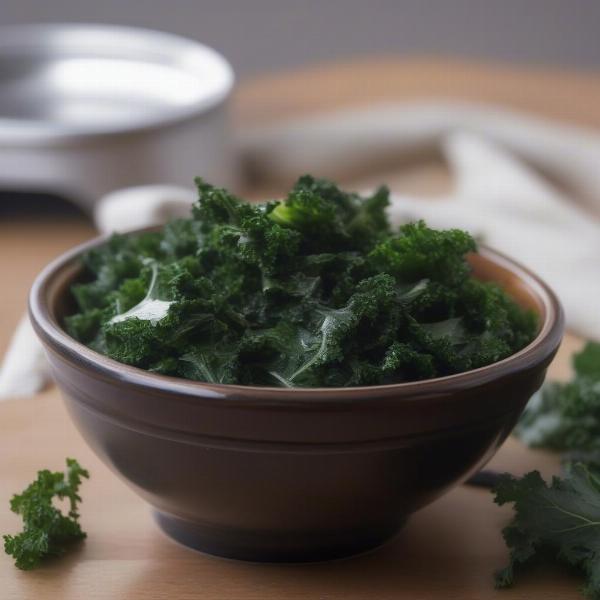Kale, often touted as a superfood for humans, can also offer some nutritional benefits for our canine companions. However, it’s crucial to understand how to prepare kale for dogs safely and effectively. Incorrectly prepared kale can potentially cause digestive upset or even more serious health issues. This guide will walk you through the best practices for adding this leafy green to your dog’s diet.
Is Kale Good for Dogs?
Yes, kale can be a healthy addition to a balanced dog diet, offering vitamins like A, K, and C, as well as antioxidants and fiber. Vitamin A supports eye health, while Vitamin K is essential for blood clotting. The fiber in kale can aid digestion, promoting regular bowel movements. However, kale also contains calcium oxalate, which can contribute to kidney and bladder stones in susceptible dogs. Therefore, moderation is key.
Safely Introducing Kale to Your Dog’s Diet
Start with small amounts of properly prepared kale to monitor your dog’s reaction. Introduce it gradually, mixing it with their regular food. Watch for any signs of digestive upset, such as vomiting or diarrhea. If your dog experiences any negative effects, discontinue feeding kale and consult your veterinarian.
How to Prepare Kale for Dogs: Steaming, Boiling, and Pureeing
The best way to prepare kale for dogs is to minimize the potential for digestive upset and maximize nutrient absorption. Raw kale is difficult for dogs to digest and can pose a choking hazard, especially for smaller breeds. Here are three recommended preparation methods:
Steaming
Steaming kale helps to break down the tough fibers, making it easier to digest. Simply wash the kale thoroughly, chop it into bite-sized pieces, and steam it until tender. Avoid adding any seasonings or oils.
Boiling
Boiling kale is another effective way to soften the leaves. Similar to steaming, wash and chop the kale before boiling it until tender. Again, avoid adding any seasonings or oils.
 Boiled Kale for Dogs
Boiled Kale for Dogs
Pureeing
Pureeing kale creates a smooth, easily digestible addition to your dog’s food. Steam or boil the kale until tender, then blend it into a puree. You can mix this puree directly into their meal. This method is particularly beneficial for small dogs or those with sensitive stomachs.
Can Dogs Eat Kale Stems?
While not toxic, kale stems are very fibrous and can be tough for dogs to chew and digest. It’s best to remove the stems before serving kale to your dog.
How Much Kale Can I Give My Dog?
Kale should only be given as an occasional treat and should not make up a significant portion of your dog’s diet. A good rule of thumb is to offer no more than a few small pieces of prepared kale per week. Always consult your veterinarian before adding new foods to your dog’s diet, especially if they have any pre-existing health conditions.
Conclusion
Kale can be a nutritious and enjoyable treat for your dog when prepared correctly. Remember to start with small amounts, monitor your dog’s reaction, and consult your veterinarian with any concerns. By following these guidelines, you can safely incorporate this leafy green into your furry friend’s diet.
FAQs
- Can puppies eat kale? While generally safe, it’s best to wait until your puppy is a bit older and their digestive system is more developed before introducing kale. Consult your veterinarian for personalized advice.
- What if my dog eats raw kale? A small amount of raw kale is unlikely to cause serious harm, but it can lead to digestive upset. Monitor your dog for any unusual symptoms.
- Can kale replace other vegetables in my dog’s diet? Kale should be a supplemental treat, not a replacement for other important vegetables. Variety is key to a balanced diet.
- Is frozen kale okay for dogs? Yes, frozen kale can be used, but ensure it’s thawed and prepared properly before serving.
- Can I give my dog kale chips? Avoid giving your dog kale chips intended for human consumption, as they are often seasoned with salt and other ingredients that can be harmful to dogs.
- Can dogs with kidney problems eat kale? Due to its oxalate content, kale is not recommended for dogs with kidney issues. Consult your veterinarian.
- What are other healthy green vegetables for dogs? Spinach, broccoli, and green beans are good alternatives to kale.
ILM Dog is your trusted resource for all things dog-related. We provide expert advice on dog breeds, health, training, nutrition, grooming, and much more. From puppy care to senior dog support, we’re here to help you every step of the way. For expert guidance on dog nutrition and other pet-related queries, contact us at [email protected] or call +44 20-3965-8624. Visit ILM Dog today!